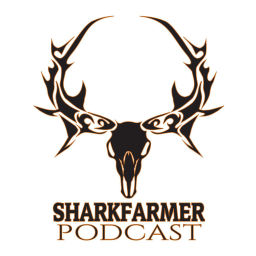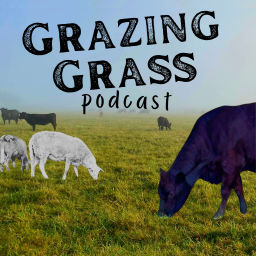
by Tim Hammerich and Abbey Wick, Ph.D.
Welcome to the Soil Sense Podcast, where we believe that building healthier soils is not just a prescription, but rather a pursuit. This journey requires collaboration, curiosity, and communication among farmers, agricultural researchers, agronomists, consultants, and extension. You’re going to hear their stories and discover how and why they’re working together to make sense out of what’s happening in the soil.
Language
🇺🇲
Publishing Since
7/29/2019
Email Addresses
1 available
Phone Numbers
0 available

April 7, 2025
<p>Introducing: season eight of Soil Sense! Co-hosts Tim Hammerich and Dr. Abbey Wick are excited to bring another season to the show, this time sponsored by Syngenta. Season eight explores soil health at scale, featuring farmers from all around the world. </p><p> Science and innovation have unlocked incredible gains in agricultural productivity and sustainability over the years. But there's still so much potential out there, especially if we're able to leverage a better understanding of soil science. We're joined today by Syngenta CEO, Jeff Rowe, and chief soil scientist, Dr. Matt Wallenstein. They challenge us consider the art of the possible when it comes to the future of soil health.</p><p><strong>“ For most farmers, a lot of farmers in the world, the land is their most important investment. And in some ways, historically, it's been what we understood the least.” - Jeff Rowe</strong></p><p> Jeff Rowe is the CEO of Syngenta group based in Basel, Switzerland. But the other hat he wears is that of a family farmer. These two vantage points, as an agribusiness CEO and a farmer, make him an excellent guest to kick off this season. </p><p><strong>“ Because we hadn't given as much attention to the soil, that now represents the biggest opportunity we have to increase productivity and sustainability in the next decade.” Matt Wallenstein, Ph.D.</strong></p><p>Dr. Matt Wallenstein joined Syngenta with a background in research at Colorado State, and as an entrepreneur. He launched a startup to commercialize some of this research. He was recruited by Jeff to lead the company's soil health efforts. </p><p>Jeff and Matt discuss the potential for soil health to advance agricultural productivity and sustainability.</p><p><br></p><p><strong>This Week on Soil Sense:</strong></p><ul><li><p>Meet farmer and Syngenta CEO Jeff Rowe and chief soil scientist Dr. Matt Wallenstein</p></li><li><p>Explore how scientific advancements in soil science can lead to opportunities for farmers</p></li><li><p>Consider the importance of resilient soil, the balance of traditional and modern farming methods, and Syngenta's commitment to supporting soil health globally</p></li></ul><p><br></p><p>Thank you to Syngenta for sponsoring this season of the Soil Sense podcast. If you are interested in what soil health looks like in practice and on the farm, please subscribe and follow this show on your favorite podcast app, and leave us a rating and review while you’re there!</p><p><br></p>

September 29, 2023
<p>In this episode we wrap up season seven of the soil sense podcast with a well known and well respected farmer and long-time soil conservationist, Barry Fisher. Barry recently retired from his career at the USDA, where he most recently worked in the soil health division. In that capacity he met and spoke with farmers about soil health throughout the central part of the US. Since retirement, Barry manages his family farm in Greencastle, Indiana and has a consulting business where he does training and soil health education for organizations through Fisher Soil Health LLC. Barry discusses soil health principles, important considerations for transition to regenerative practices, and the essential role of a knowledgeable advisor.</p> <p><strong>“If you really think about it, our current crops are only feeding the biology June, July, a little bit of May, and maybe a little bit of August. That's a very small percent of the total year… We did a lot of talking about no till as far as protecting erosion, but when we added cover crops to it, that was a game changer in that now the cover crop immediately fed more biology longer. That biology immediately started providing aggregate stability which absolutely helps the surface infiltration of soil, the aeration of soil. You know you start getting better structure to the surface of the soil and that can happen in as little as one season when we add cover crops.” - Barry Fisher</strong></p> <p>One visual Barry has used to help demonstrate soil health to producers is what he has called the “fence row effect.” Previous fence rows can illustrate the value and yield potential when incorporating the four principles of soil health. There is a reduction in disturbance, added diversity of plant life, maintained living roots in the soil and because of that the soil is kept covered. These four principles can allow producers to see a bump in yield in these areas. Barry goes on to explain how to generalize some of those principles on an operation-wide basis. </p> <p><strong>“Generally there's some farmer in the front row that says, “Okay Fisher, that's great, but, my landlord wants me to farm the whole farm, not just the old fence rows.”... I can show those aerial photos where management on one farm had the four principles kind of in place and the management on the farm right next to it did not. And the aerial photo is very telling that yes, we can manage beyond the fence row. We can get that fence row effect across the entire farm.” - Barry Fisher</strong></p> <p><br></p> <p><strong>This Week on Soil Sense:</strong></p> <ul> <li><p>Meet Barry Fisher a current Indiana farmer and retired USDA soil conservationist</p> </li> <li><p>Explore what Barry calls the “fence row effect” and how that can be applied to demonstrating the four principles of soil health</p> </li> <li><p>Discover Barry’s recommendations in transitioning tillage and cover crop practices</p> </li> </ul> <p><br></p> <p>Thank you to the Soy Checkoff for sponsoring this Farmers for Soil Health series of the Soil Sense podcast. This show is produced by Dr. Abbey Wick, Dr. Olivia Caillouet, and Tim Hammerich, with support from the United Soybean Board, the University of Missouri Center for Regenerative Agriculture and the Soil Health Institute.</p> <p>If you are interested in what soil health looks like in practice and on the farm, please subscribe and follow this show on your favorite podcast app, and leave us a rating and review while you’re there. Check out the Farmers for Soil Health website at <a href="http://farmersforsoilhealth.com">FarmersForSoilHealth.com</a>.</p>

September 29, 2023
<p>Throughout this series, we have featured a lot of large scale commercial farming operations, but soil health is just as important to farms that operate on smaller acreages as well. Mike Lewis is a farmer, military veteran, and the senior manager for the National Center for Appropriate Technologies. Mike farms in southeastern Kentucky on a small farm in the western foothills of the Appalachian Mountains. His farm consists of 126 acres, 12 of which he uses to grow fresh market vegetables and the other 114 is a forest-based pasture system where he raises cattle, pastured pork and pastured poultry. </p> <p><strong>“For me, soil health is the most critical thing to the success of our operation… One of Wendell Berry's quotes is, “What I stand for is what I stand on.” And I think that soil is what we all stand on. And it's the foundation for all life and sustenance on this planet. So there's nothing more important than healthy soils.” - Mike Lewis</strong></p> <p>As the senior manager in the sustainable agriculture and rural communities division of NCAT Mike focuses on building resilient communities and supporting farmers in sustainable production systems. The <a href="https://www.armedtofarm.org/">Armed to Farm</a> and <a href="https://soilforwater.org/">Soil For Water</a> programs are two of the many programs he contributes to. Mike also opens up his own family farm to other producers to demonstrate some of the soil health principles he has incorporated on his operation.</p> <p><strong>“I think that one of the things that we're really focused on is being able to have a place where we can show other producers other alternatives to production, right?</strong></p> <p><strong>We open our farm up three or four times a year for other producers to come on and look at our hog production system and to learn how we've reduced our feed inputs by timing of our farrowing and our pasture management skills.” - Mike Lewis</strong></p> <p><br></p> <p><strong>This Week on Soil Sense:</strong></p> <ul> <li><p>Meet Mike Lewis, a Kentucky farmer, military veteran, and the senior manager for the National Center for Appropriate Technologies</p> </li> <li><p>Discover Mike’s journey from the farm to the military and back to the farm to raise his family</p> </li> <li><p>Explore the <a href="https://www.armedtofarm.org/">Armed to Farm</a> and <a href="https://soilforwater.org/">Soil For Water</a> programs and the opportunities they offer producers</p> </li> </ul> <p><br></p> <p>Thank you to the Soy Checkoff for sponsoring this Farmers for Soil Health series of the Soil Sense podcast. This show is produced by Dr. Abbey Wick, Dr. Olivia Caillouet, and Tim Hammerich, with support from the United Soybean Board, the University of Missouri Center for Regenerative Agriculture and the Soil Health Institute.</p> <p>If you are interested in what soil health looks like in practice and on the farm, please subscribe and follow this show on your favorite podcast app, and leave us a rating and review while you’re there. Check out the Farmers for Soil Health website at <a href="http://farmersforsoilhealth.com">FarmersForSoilHealth.com</a>. </p>

Ag PhD

John Kempf

Clay Conry

Jared Luhman

Joe Vaclavik

Rob Sharkey

Grazing Grass

Justin Mills

Cover Crop Strategies

Strip-Till Farmer

Dr Max Gulhane

The Way I Heard It with Mike Rowe

Cumulus Podcast Network | VINCE

Tucker Carlson Network
Pod Engine is not affiliated with, endorsed by, or officially connected with any of the podcasts displayed on this platform. We operate independently as a podcast discovery and analytics service.
All podcast artwork, thumbnails, and content displayed on this page are the property of their respective owners and are protected by applicable copyright laws. This includes, but is not limited to, podcast cover art, episode artwork, show descriptions, episode titles, transcripts, audio snippets, and any other content originating from the podcast creators or their licensors.
We display this content under fair use principles and/or implied license for the purpose of podcast discovery, information, and commentary. We make no claim of ownership over any podcast content, artwork, or related materials shown on this platform. All trademarks, service marks, and trade names are the property of their respective owners.
While we strive to ensure all content usage is properly authorized, if you are a rights holder and believe your content is being used inappropriately or without proper authorization, please contact us immediately at [email protected] for prompt review and appropriate action, which may include content removal or proper attribution.
By accessing and using this platform, you acknowledge and agree to respect all applicable copyright laws and intellectual property rights of content owners. Any unauthorized reproduction, distribution, or commercial use of the content displayed on this platform is strictly prohibited.
